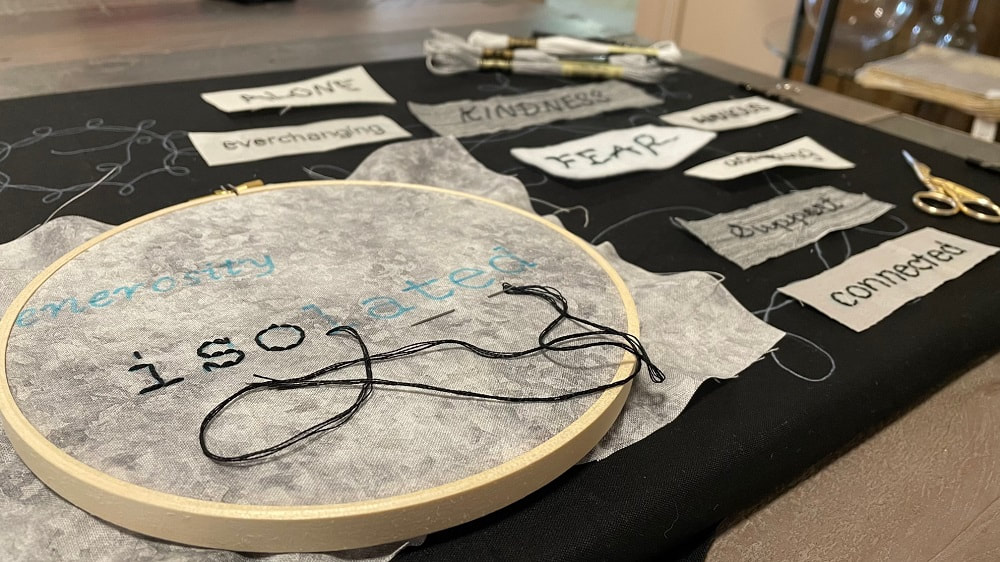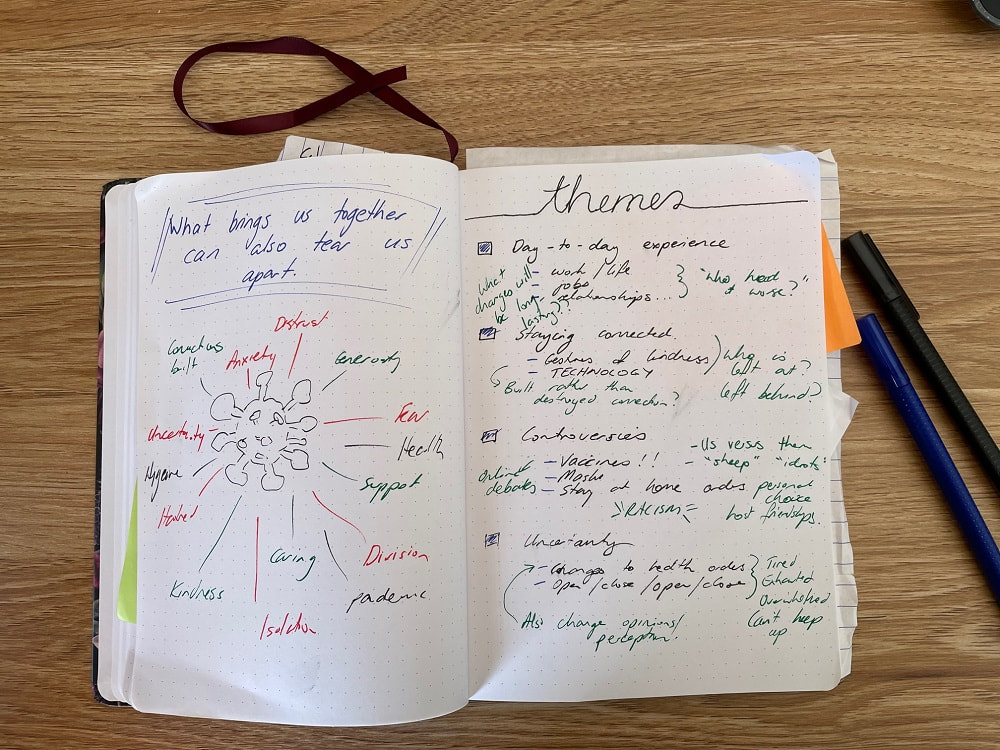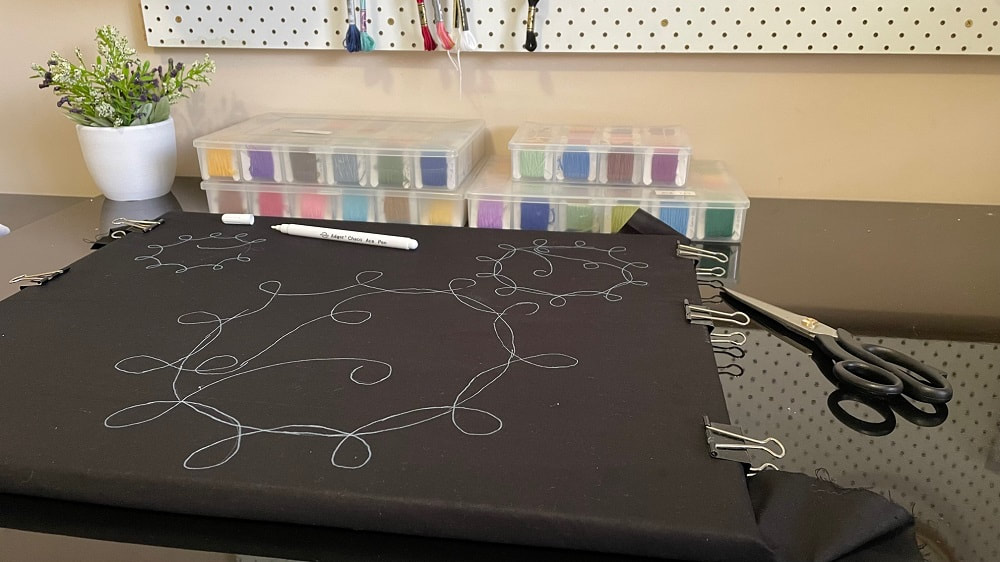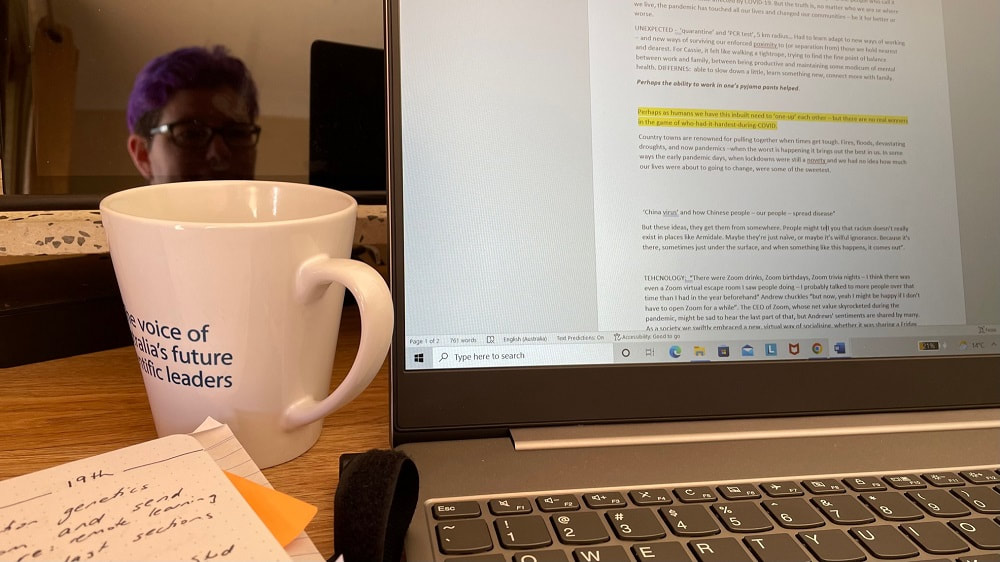See our other 2022 grant winner:
Aunty Kerry Bulloojeeno Archibald Moran
Aunty Kerry Bulloojeeno Archibald Moran
In February 2022, two micro-grants of $1000 each were granted for a new, original short work, for writers and creatives over 18, residing in New England and creating for adult readers/audiences in any genre. Works could be multi-arts and the theme was "Community in a time of change", which could be interpreted in a variety of ways.
The NEWC is excited to be able to support Dr McMillan as she moves away from an academic career and into the arts with her mixed media project, blending narrative with embroidered artwork.
The NEWC is excited to be able to support Dr McMillan as she moves away from an academic career and into the arts with her mixed media project, blending narrative with embroidered artwork.
All rights are retained by the author.
The warp and weft of time and story
|
Time seems to have a weird way of warping and disappearing lately. When I started this project it felt like I had all the time in the work - time for leisurely chats with people over coffee and long message exchanges to collect their stories. And then, suddenly, it was almost time to submit and there was a rush to try and wrangle those different stories into something cohesive. It never feels like there is enough time to polish and refine - and as a 'new' writer I have certainly felt some doubts that what I could produce would be 'good enough'.
Working on the project itself I was surprised how much I learnt from people telling me about their experiences over the past 2 years. There were things people shared that I could really relate to, but other things that were totally removed from my own experience. I hope that when people read this piece they might have the same reaction - they may read something that resonates with them and reflects their own experience - but also something that might challenge them to look at things a bit differently or to consider another point of view. This is the first time I've written anything based on interviews with people, and I have discovered I really, really love just talking to people and listening to the stories they want to tell. When I first pictured writing this piece I thought I would put more of myself and my own thoughts/experiences into it. But as I started writing I wanted it to be about capturing the really varied reactions that other people had had, and not about me. I hope it was cathartic for people to have someone to listen to what they wanted to say about the pandemic - there is so much more that I heard than what is in this piece, but I wanted to keep it as a short, sharp reflection. Although I now probably have enough material to fill a book... |
As part of this project I wanted to create not just words, but also something physical, an art piece to accompany the work. This is still, currently a work in progress (see comments about time just disappearing!).
There are a few things that I wanted this piece to capture - being a writing grant I wanted to focus on words, and the things I heard people say time and time again. So embroidered words are the main focus of the work. I also wanted to try and capture the notion that everyone's experiences were unique, and that a community is about all these different experiences coming together - this is reflected in the patchwork sort of style that I'm using - lots of different pieces coming together to make a whole. I also have a line near the end of my work about things not being black and white, good or bad, and I wanted to capture this as well - so that has influenced my choice of colours, using black and white, but also shades of grey. I'm looking forward to putting together the finishing touches and sharing the complete piece soon! |
The lines that divide: |
a regional reflection on COVID-19
|
|
“My experience during COVID?” Cassie lets out a quiet snort-laugh and lifts her coffee mug. “I was working at home...or at least trying to. With two school kids to teach. Enough said!” Tucked away in regional NSW, removed from the bustle of the big cities with their raging case numbers and extended stay-at-home orders, it would be easy to think that Armidale, and the people who call it home, may have been little affected by COVID-19. But the truth is, no matter who we are or where we live, the pandemic has touched all our lives and changed our communities – be it for better or worse.
Few could have predicted, way back in early 2020, that ‘quarantine’ and ‘PCR test’ would soon become part of our vernacular, our worlds narrowed to a 5 km radius from our houses, and a trip to the supermarket would seem like a significant outing. Many of us, like Cassie, had to learn adapt to new ways of working – and new ways of surviving our enforced proximity to (or separation from) those we hold nearest and dearest.
For Cassie, it felt like walking a tightrope, trying to find the fine point of balance between work and family, between being productive and maintaining some modicum of mental health. Yet for some co-workers, the experience was vastly different. They felt they were able to slow down a little, take the time to learn something new, connect more with family. Perhaps the ability to work in one’s pyjama pants helped. Working at home was one side of the coin. The flip side was not working at all – something experienced by many as entire industries were shut down overnight. “You hear a lot about how tough it was for parents with kids at home during lockdowns” Jade shared, “and I’m sure it was no cake walk. But you what else is really tough? Not having any income at all because your job has suddenly disappeared.” And then there were our essential workers, suddenly thrust into the spotlight, often hailed as heroes, but also on occasion targets for abuse as they worked to enforce health orders and keep our community safe. Perhaps as humans we have this inbuilt need to ‘one-up’ each other – but there are no real winners in the game of who-had-it-hardest-during-COVID. Country towns are renowned for pulling together when times get tough. Fires, floods, devastating droughts, and now pandemics –when the worst is happening it brings out the best in us. In some ways the early pandemic days, when lockdowns were still a novelty and we had no idea how much our lives were about to change, were some of the sweetest. There are stories of neighbours popping stuffed toys in their windows for children to spot on their daily walks. Care packages dropped, contact free of course, for friends and neighbours to discover. Offers of help and support posted on community Facebook pages. Countless tiny signs of people coming together, while staying at least 1.5 metres apart. But for all this sweet, there was, for some in our community, a much sourer note. “Our son came home one day, upset. Some of the kids at school had been talking about the ‘China virus’ and how Chinese people – our people – spread disease” Kim fidgets with her napkin as she speaks, the memory still clearly fresh – and painful. “I don’t blame the kids. They are just kids. But these ideas, they get them from somewhere. People might tell you that racism doesn’t really exist in places like Armidale. Maybe they’re just naïve, or maybe it’s wilful ignorance. Because it's there, sometimes just under the surface, and when something like this happens, it comes out”. Staying connected while we couldn’t go out was, to put it lightly, a challenge. A challenge that was, in part, made easier by technology. “There were Zoom drinks, Zoom birthdays, Zoom trivia nights – I think there was even a Zoom virtual escape room I saw people doing – I probably talked to more people over that time than I had in the year beforehand” Andrew chuckles “but now, yeah I might be happy if I don’t have to open Zoom for a while”. The CEO of Zoom, whose net value skyrocketed during the pandemic, might be sad to hear the last part of that, but Andrews’ sentiments are shared by many. As a society we swiftly embraced a new, virtual way of socialising, whether it was sharing a Friday night drink, or celebrating a milestone birthday, or even a live-streamed wedding.
|
For some though, the rise and rise of online meetings was a curse rather than a blessing.
Evelyn is one of them. She lives alone, separated from children and grandchildren by around 500 km – usually a manageable distance, but made insurmountable by travel restrictions. For people like Evelyn, the sudden reliance on technology made her feel more, rather than less, isolated. “I don’t know how to do all these things on the computer. My daughter, she would try and explain to me, but it was so hard. I feel like some of us, especially my generation, who aren’t so good with the technology, we got a bit forgotten about. It was a very lonely time." It would be difficult to write about the impact of COVID on communities without a word or two about vaccines. “I know you’re a science person, so you’ll probably just think I’m an idiot (for the record, I don’t). But I still think it all happened way too fast, and we don’t know how safe it is yet”. There are more opinions on COVID vaccines than I can count on my fingers and toes combined. They’re safe. They’re dangerous. They work. They don’t work. They are the culmination of decades of previous work. They were developed too fast. Everyone should have them. No one should have them. Only some people should have them. It should be mandated. It should be a choice. These vaccine debates are more than just a question of health – the topic itself has changed relationships. “I have lost friends over it” admits Sam “But then, maybe I don’t want to be friends with someone who believes some YouTube video over actual scientists.” When we meet in person perhaps we politely change the subject to avoid a debate, or simply move on when we encounter an opinion contrary to ours. But in the online world few people seem to hold back. Local community pages have been rife with debate, and it gets heated. You might be a ‘sheep’ for following vaccine recommendations. You might be a ‘covid-iot’ for avoiding the jab. You might be poisoning your family by having the vaccine. You might be endangering them by not. Vaccines have been, and continue to be, a contentious issue – but the vaccine roll out has also brought us moments of togetherness, with community organisations coming together to organise mass vaccination events. Perhaps, whichever side of the debate we are on, we can all appreciate that there is something special in hundreds of people coming together to take part in something bigger than themselves. Much like the virus itself, health orders have shifted constantly over the past two years, and so have public perceptions of the virus. “When I got COVID, when this whole thing was early on, I was so scared to let anyone know. I felt like I’d be super judged, people would think I’d broken the rules or something” Sarah wrote “but now it’s like everyone is getting it and it’s no big deal. I feel like there’s really a double standard. I had to hide out and now everyone’s all over social media sharing their iso experience”. The same shift in attitudes has been noticed as mask mandates have been introduced, then lifted, then introduced, and lifted again. Six months ago you might have been treated like a pariah if you dared to show your face in public without a mask. Now, it’s those who choose wear masks who face questions. “I’ve been told a lot of times ‘you don’t have to wear that’” explains Ian “People don’t seem to understand that this ‘thing’ is not yet over. I don’t have to wear a mask, but I do, I still want to protect myself. It’s strange to get odd looks for wanting to stay safe.” The human brain is an amazing thing. It has the ability to learn, to change, to adapt. But it isn’t easy – it takes time and effort. The rapid mental U-turns we’ve been asked to make time and time over the past two years have taken their toll, on us as individuals, but also on the way we relate to and interact with others.
It seems that for each thread helping to hold our community together through COVID, there has also been a line dividing us. For each action and reaction that brought us together, another exists that would drive us apart. But it would be too simplistic to think that any of us fall entirely into one or the other camp. Our pandemic responses have not been as simple as black or white, right or wrong. The same hand that reached out to offer assistance to one neighbour might slam the door in the face of another because of the country that they hailed from. The same voice that spoke out encouraging vaccination might also be raised in derision against those that choose to continue wearing masks. Our COVID stories, our experiences, our reactions, the ways we have changed and continue to change, are as many and as varied as the people who live here. |




